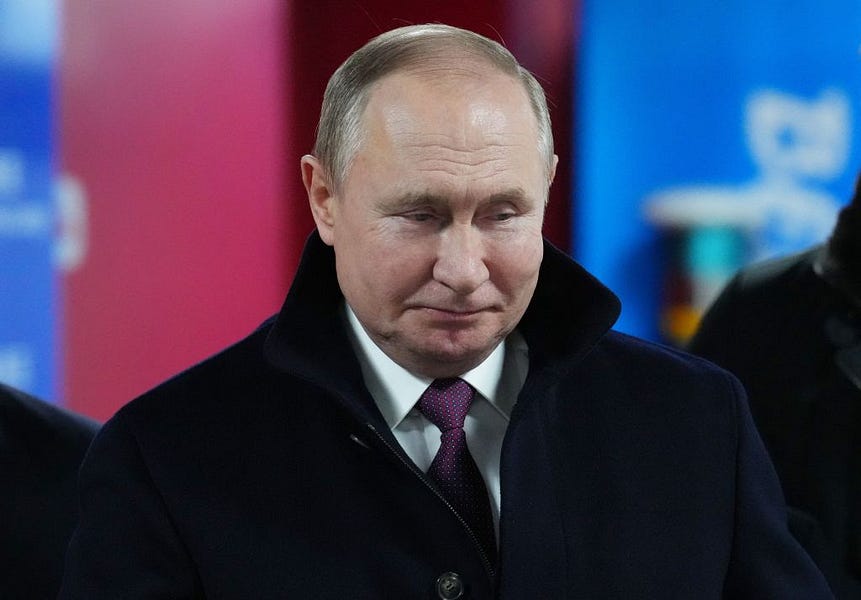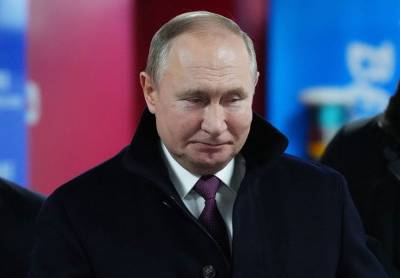A strange thing is happening online and over the airwaves—one of the strangest I’ve ever seen. The old left and the new right are launching a vigorous anti-war movement in response to a potential Russian invasion of Ukraine when there is no pro-war movement. There is not a single national leader who is arguing that the United States should deploy to Ukraine and fight the Russians. President Biden has ruled it out. The GOP isn’t demanding that the president send troops to Kyiv.
But you’d never know it from the rhetoric. In his excellent Substack, Noah Smith has compiled a list of voices who are condemning a fictional march to war. There’s Bernie Sanders allegedly hearing “familiar drumbeats.” Mystifyingly, The Nation’s Jeet Heer argues that the desire to “stay out of the conflict” is a position that “barely registers in media, policy circles & politics.”
Smith calls out Sohrab Ahmari for a piece in the Washington Post where he condemned alleged “work-from-home MacArthurs” Rich Lowry, Ted Cruz, and the Wall Street Journal editorial page. Yet, as Smith points out, not one of those people has called for military intervention in Ukraine.
Smith could easily have kept compiling lists of public voices who are vigorously trying to stop an American war that no one is trying to start. Tucker Carlson has been on this beat for weeks, unloading with both barrels night after night, not only denigrating the very purpose and existence of the North Atlantic Treaty Organization, but mocking GOP senators who seek to more aggressively deter Russia through a bipartisan sanctions bill as, for example, “a moron masquerading as a senator” or a “pompous neocon buffoon.”
Yet support for crippling sanctions, including blocking the Nord Stream 2 pipeline, that would kneecap the Russian economy along with supplying weapons that could inflict real damage on Russian forces is far from a call for war. It’s an effort to tell Russia that war would be too costly to wage, even if our boots aren’t on the ground.
My friend Rod Dreher has been cheering Tucker on. His most recent relevant post is headlined “Tucker Carlson vs. The GOP War Party.” I like Rod, but I don’t see the war party anywhere. I’m an unreformed advocate for the Iraq War. I still think it was just and proper, and even I’m not advocating that we send troops to Ukraine. I recently asked a GOP senator if he knew of a single member of the GOP caucus who supported sending troops to Ukraine. He couldn’t think of one.
So what gives? Noah Smith posits that folks are still fighting the war over the last war. They’re thinking about Iraq. Here’s Smith:
I can’t find anyone other than a few no-name Twitter cranks pushing for a U.S. war with Russia over Ukraine. These progressives [Smith focused on progressives] are shadowboxing with a fictitious opponent that exists only in their own minds.
And it’s not hard to see who that opponent is: It’s the Iraq War. Remembering how a hawkish media and foreign policy apparatus helped the Bush administration build support for that disaster, they’re clearly trying to prevent a repeat of the same.
I absolutely think there’s something to this. There is a widespread American consensus (again, I don’t share it) that we overreached in Iraq and even that we overreached in Afghanistan. People are deeply leery of any additional military commitments.
But I think there’s something else, something older and deeper at work, and it’s a place where parts of the right and parts of the left have long met. Simply put, they want America to retrench—to pull back from its extensive international commitments. To recommit resources here at home that we’ve expended maintaining our immense web of military commitments abroad.
According to this school of thought (again, this long predates the Iraq war), America’s foreign deployments and America’s alliances don’t just drain American resources, they’re destabilizing all on their own. To quote Tucker, NATO exists “primarily to torment Vladimir Putin.” Or to use Glenn Greenwald’s language, our expressions of solidarity and support to Ukraine are part of the problem:
Thus, what we’re looking at is not just an Iraq-influenced desire for greater caution, but an old argument that America and the world are better off if we pull back and let other great powers take the lead, especially in the zones close to their homes.
This is a serious argument, worth considering. And it would have considerably greater force if we could point to allied governments and/or allied forces who could and would step forward if we stepped back. In other words, we know that any retrenchment will create a power vacuum. Who fills the void?
If the response to an American retrenchment is British, French, or Japanese assertion, then that might be an acceptable trade. But we know who is poised to push forward if America retreats. In conflict zones in the Middle East, it’s America’s jihadist foes (including Iran). In Europe and East and Southeast Asia, it’s our great power rivals.
When I was in Iraq, the question that dominated our minds tactically and strategically was when to step back. Our approach was summed up in three words—clear, hold, and build. We’d clear the enemy from a town, hold it against harassing attacks designed to drive us away, and build security forces that could stand up when we left.
The strategy was so successful that by the end of the surge, only a few thousand American troops could help guarantee national peace. But to pull them all out? That was a disaster. It was a disaster in Iraq, and it was a disaster almost a decade later in Afghanistan. We’ve watched, aghast, as our enemies advanced every time that we retreat.
That’s been true in the Middle East. It will be true in Europe.
There’s hardly an American alive who remembers the Old World, the world before World War II, before NATO, and before the Pax Americana. In that old world, smaller countries often existed at the mercy of the great powers. Spheres of influence collided and overlapped. And we sat back (even after our nation became a great power in its own right), content to let Europe fight its own wars.
In other words, we lived in the world that parts of the new right and old left seem to covet—a world where America largely minded its own business. We focused on life here at home or in our near abroad and left the foreign powers to manage their own affairs—right until the point where millions died and we fought two wars we never wanted to fight.
Russia is testing the West. Vladimir Putin knows we’re not going to fight for Ukraine. He knows he can take Ukraine. But what he doesn’t know is whether his conquest will be worth the cost. And here’s the fundamental reality—the “leave Russia alone” position is the position most likely to lead to conflict, to enable a war that will kill thousands and inevitably inflict unintended consequences on Europe and the world.
By contrast, a determined message to Russia that it will face profound and bloody consequences if it invades is the anti-war position. American and allied economic might can inflict an immense financial cost on Russia. American and allied weapons, supplied to Ukrainian forces and Ukrainian insurgents, can inflict serious personnel and material costs on Russia. Putin has to know that we won’t blink from imposing economic pain and military costs beyond what his nation can reasonably bear.
World War II appeasement analogies are overdone. Not every villain is Hitler, and not every wavering politician is Chamberlain. But we don’t have to go back to the days leading to World War II to know that permitting great powers to treat sovereign nations as disposable assets—to be dominated, invaded, and sometimes even destroyed—is inherently dangerous.
America is extended across the world, but the question isn’t so much whether we can afford it as whether we can afford not to exert our presence and our will. The American economy is still the strongest in the world, and our defense expenditures don’t threaten our prosperity. In fact, our defense budget as a percentage of GDP is near a 60-year low. We can afford our present commitments. We can afford the most powerful military in the world and the weapons we can supply to embattled friends. And we can afford to wield economic weapons to help keep the peace.
In fact, we could have easily afforded our presence in Iraq before Barack Obama withdrew. We could have easily afforded to retain a decisive presence in Afghanistan—one that would preserve the government in Kabul and prevent a Taliban takeover—before Trump’s “peace deal” with the Taliban and Biden’s retreat.
When we consider an outright American pullback—such as in Iraq or Afghanistan—or an American decision to withhold potentially decisive economic and military assistance from an allied nation in distress, granting its enemy tacit permission to invade and conquer a sovereign nation, we have to ask ourselves, does America benefit when our enemies advance?
Here’s the bottom line—in the present debate, the “doves” advocate policies that make war more likely. The “hawks” are the best hope for peace. And no one wants Americans to fight Russians in Ukraine.
One last thing …
It’s happening. On Super Bowl Sunday, Amazon dropped the teaser trailer for Rings of Power, its Lord of the Rings series set in Tolkien’s mythical Second Age (when the rings were forged). The teaser triggered our most vigorous in-house Dispatch argument yet. Several Dispatch-ers said they’re pessimistic about the series, and the trailer made them more pessimistic. These people are wrong. The series is going to be great. It’s going to be magnificent. It’s going to be glorious. I can’t wait. Watch the trailer and share your hopes and dreams for Rings of Power in the comments below.







Please note that we at The Dispatch hold ourselves, our work, and our commenters to a higher standard than other places on the internet. We welcome comments that foster genuine debate or discussion—including comments critical of us or our work—but responses that include ad hominem attacks on fellow Dispatch members or are intended to stoke fear and anger may be moderated.
With your membership, you only have the ability to comment on The Morning Dispatch articles. Consider upgrading to join the conversation everywhere.